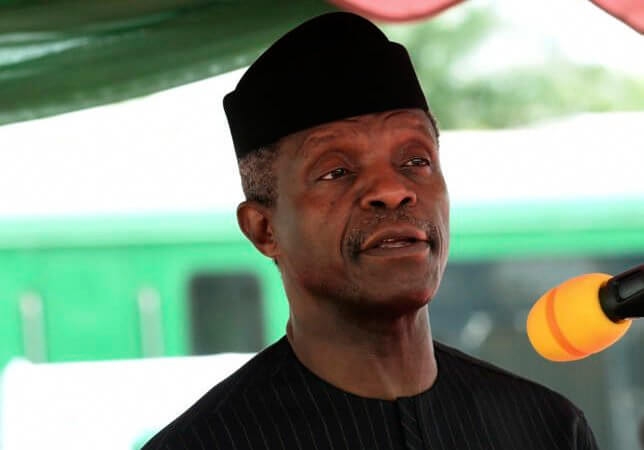 Acting President Yemi Osinbajo[/caption]
Acting President Yemi Osinbajo[/caption]
Acting President Yemi Osinbajo, SAN, has said the judgement by the International Court of Justice (ICJ) on 10 October, 2002, ordering Nigeria to transfer sovereignty of Bakassi to Cameroun, was a great loss to the country.
Osinbajo stated this while responding to issues raised by stakeholders at the Townhall meeting in Calabar, organized in continuation of the series of engagements with leaders in the Niger Delta region.
Bakassi is a peninsula on the Gulf of Guinea. It lies between the Cross River estuary, near the city of Calabar in the west, and the Rio del Ray estuary on the east. It is governed by Cameroon, following the transfer of sovereignty from Nigeria as a result of the ICJ judgment.
Advertisement
Nigeria and Cameroon have disputed the possession of Bakassi for some years, leading to considerable tension between the two countries. In response, Cameroon took the matter to the International Court of Justice (ICJ) on 29 March 1994.
The ICJ delivered its judgment on 10 October 2002, finding (based principally on the Anglo-German agreements) that sovereignty over Bakassi did indeed rest with Cameroon. It instructed Nigeria to transfer possession of the peninsula, but did not require the inhabitants to move or to change their nationality. Cameroon was thus given a substantial Nigerian population and was required to protect their rights, infrastructure and welfare.
Osinbajo further assured displaced Nigerians in Bakassi that the Federal Government would address their plight.
The Acting President explained that the move is in line with the Muhammadu Buhari-led administration’s policy on serving the interest of all Nigerians regardless of their affiliations.
Advertisement
“The ceding of Bakassi as a result of the judgement of the ICJ is a development that we all consider a loss,” Osinbajo said.
“But President Buhari strongly believes that while we ruminate over the legal issues we must not allow Nigerian citizens in Ikang and elsewhere to suffer.
“The Federal Government will certainly do more and engage more with the displaced in Bakassi. This is our duty and our commitment,’’ he added.
Prof.Osinbajo also gave an assurance that the Federal Government “will also thoroughly investigate the issues raised on the relationship between the military, the militants and the people of Bakassi’’, with a view to find a lasting solution to the problem.
He said the Buhari administration would not hesitate to support viable programmes and initiatives that would make living better for Nigerians.
Advertisement
“The vision of President Muhammadu Buhari for Nigeria is one where the Federal Government partners with the States to create industrial, commercial and professional opportunities for all our citizens.”
Prof. Osinbajo also urged the people of the state not to relent in ensuring the unity of the state and country as they continue to set the pace in the tourism and hospitality sector in Nigeria.
During the Scramble for Africa, Queen Victoria signed a Treaty of Protection with the King and Chiefs of Akwa Akpa, known to Europeans as Old Calabar on 10 September 1884. This enabled the British Empire to exercise control over the entire territory around Calabar, including Bakassi.
The territory subsequently became de facto part of Nigeria, although the border was never permanently delineated. However, documents released by the Cameroonians, in parity with that of the British and Germans, clearly places Bakassi under Cameroonian Territory as a consequence of colonial era Anglo-German agreements.
After Southern Cameroons voted in 1961 to leave Nigeria and became a part of Cameroon, Bakassi remained under Calabar administration in Nigeria until ICJ judgement of 2002.
The Acting President was accompanied to the forum by Ministers of Petroleum Resources, Ibe Kachukwu, Niger Delta Affairs, Usani Ughuru, the Head of the Civil Service of the Federation, Mrs Winifred Oyo-Ita, the Coordinator of the Amnesty Office, Paul Boroh, Chairman of the NDDC Board, Sen. Ndoma Egba, among other dignitaries.


